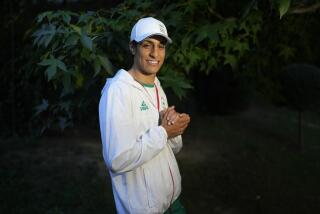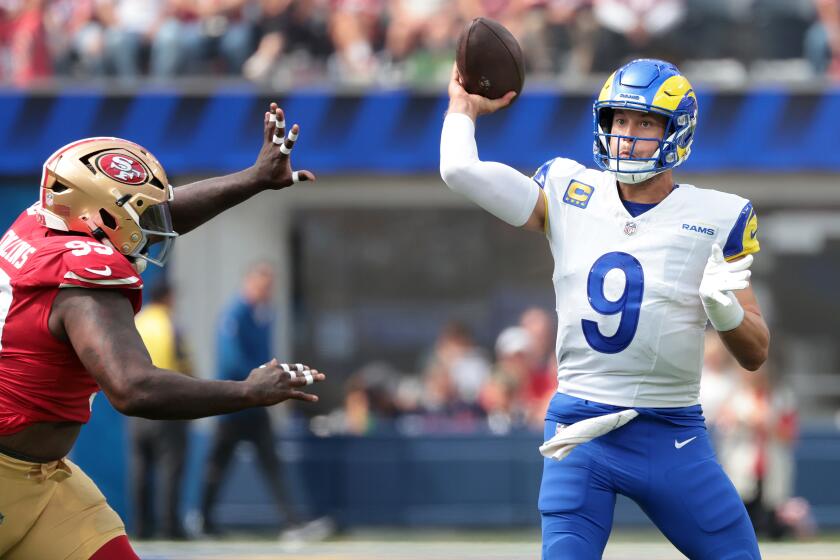Boxer Rau’shee Warren keeps dreaming the Olympic dream
- Share via
The only thing Rau’shee Warren loves more than boxing is his family. So it’s a pity he can’t have both in the same country at the same time.
Twice Warren has fought in the Olympic Games, once in Greece, once in China. Twice Warren has brought his mother Paulette.
And twice he has lost his first bout.
So when Warren steps into the ring this summer in England, Mom will be watching on TV back home in Ohio.
“The ticket problems, the worrying about your family getting to the event — that’s more distraction, taking your focus off what you came there for,” Warren says. “So this time around it’s going to be just me, my coach and my teammates. We’ll celebrate when I come back.”
Warren, 25, will make history whether or not he wins because by simply making the team he becomes the only three-time Olympian in U.S. boxing history. But Warren is no longer interested in participation awards. After returning from two previous Games empty-handed, he wants to bring back more than memories.
“I’m on a journey right now of being an Olympic champion,” he says. “You never give up on a dream. And right now it’s my dream. I chose to go the third time because I know I’m better than a lot of people thought I was. I know I’ve got to show them that hard work pays off and that I’ve never given up on my dream. That’s why I came back.”
Given where Warren’s journey started, his dream could easily have become a nightmare. He grew up in the impoverished Cincinnati neighborhood of Westwood, where he originally wanted to be a basketball player like his idol, former NBA MVP Allen Iverson.
“I had the Iverson braids. I wore No. 3. I just thought I was him,” Warren says.
But by the time he got to high school he was only 5 feet 1 so he turned his attention to boxing, a sport he had participated in since age 6, when he first stepped into the gym junior-welterweight champion Aaron Pryor once called home.
He was so small he was often matched against larger boys, yet he won his first amateur fight when he was 8. By 2004 he had made the Olympic team at 17 as a light flyweight (106 pounds), making him the youngest boxer in the Athens Games and the youngest U.S. male in any sport.
That hardly guaranteed a path to stardom, though — not in Cincinnati, which infamously devours its talented young fighters. Four years earlier another teenage boxer, Ricardo Williams, had come out of Cincinnati to win a silver medal in Sydney, only to have his promising pro career stalled when he was sent to prison on drug charges. Legal troubles also derailed 2004 Olympian Ron Siler and 1992 bronze medalist Tim Austin, who fought as “the Cincinnati Kid.”
Warren’s three older brothers wound up in prison too but he avoided trouble thanks in large part to his mother — who is the main reason he’s long resisted the allure of pro boxing. Eight years ago he pledged he would someday drape an Olympic medal over her head and he wants to keep that promise.
“Because of the struggle me and my mom went through, getting this gold medal is going to complete my trophy case,” Warren says of his mother, who had a difficult upbringing. “I’m going to put the medal around her neck so I can get over that hump and then continue to do what I’m doing for her by going pro.
“She’s one of my main supporters.”
So far, the two have known only disappointment in the Olympics. In 2004, fighting as a light flyweight, the smallest of the Olympic divisions, Warren was routed by China’s Zou Shiming in the opening round. Then four years later in Beijing, where he was a medal favorite, Warren lost his opening flyweight (112 pounds) bout to South Korea’s Lee Ok-Sung by a point after mistakenly thinking he was ahead on the judges’ scorecards with less than a minute left.
He broke down after the fight but the next morning he was in the gym, encouraging the rest of the team. In an individual sport such as boxing, it was an uncommon display of humility and camaraderie.
“I’m team captain,” he said then. “And my team isn’t done.”
That kind of responsibility is something Warren continues to take seriously. Although still only 25, he is the veteran of a young U.S. team and hasn’t been shy about sharing his wisdom.
“He tells me everything, man,” says South El Monte teenager Joseph Diaz Jr., a bantamweight. “He teaches me a lot, especially when we spar. Just sparring by itself, it helps me because I know that nobody’s going to be as fast as Rau’shee Warren.
“Rau’shee is my role model. And I believe he’s everybody else’s role model.”
Adds welterweight Errol Spence: “He is like the grandfather of the team.”
Warren’s latest project is 17-year-old middleweight Claressa Shields, who will be fighting in the first Olympic competition for women.
“I keep telling her there are very few people in the world who know what it’s like to go to the Olympics at 17,” says Julie Goldsticker, USA Boxing’s public relations consultant and the only member of the team who has been there longer than Warren.
But in addition to leading by both word and deed, teammates say Warren helps keep the mood light away from the ring. He’s silly and playful, they say. And don’t even get him started on dancing.
In London he’ll be all business, though, seeking to end his Olympic drought against a competitive field expected to include AIBA world champion Misha Aloyan of Russia, 2011 European champion Andrew Selby of Britain and 2010 Euro winner Elvin Mamishzade of Azerbaijan. And though he’s still fighting as a flyweight, the limit for the division has been raised to 114 pounds, meaning Warren will be competing at his third different Olympic weight.
And should he prevail, there will be tears in his corner again. In Beijing, they were tears of disappointment, but Goldsticker says a medal in London will bring tears of joy — and not just from Warren.
“He’s endured a lot. And his current teammates adore him and want so badly for him to finally win the Olympic medal he’s been dreaming about,” she says. “I even daydream about him winning a gold medal. He really deserves it.”
More to Read
Go beyond the scoreboard
Get the latest on L.A.'s teams in the daily Sports Report newsletter.
You may occasionally receive promotional content from the Los Angeles Times.











